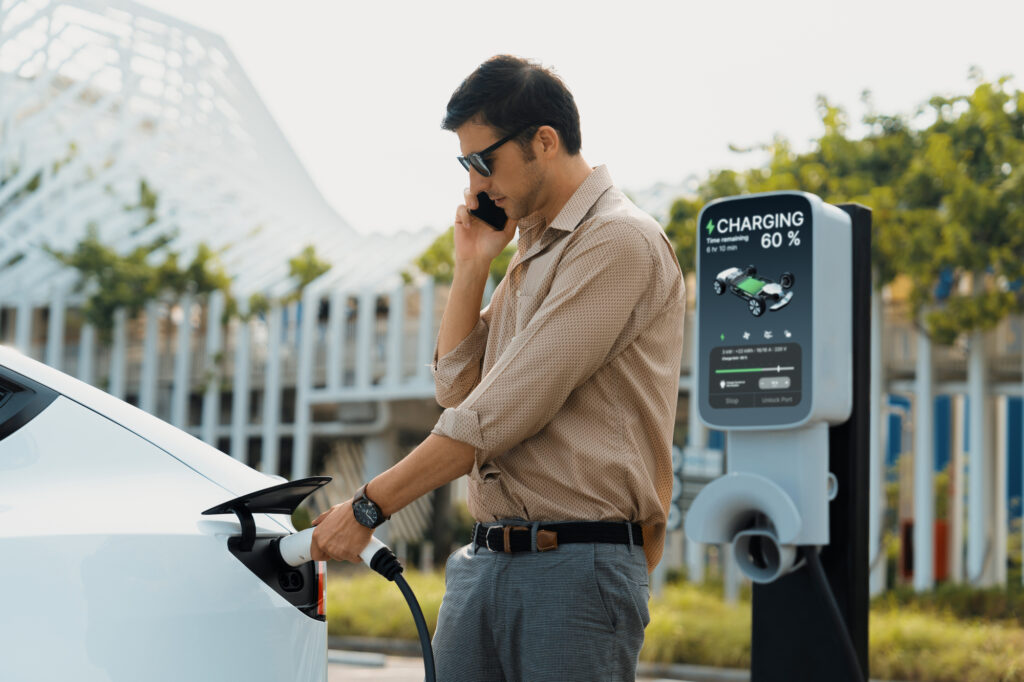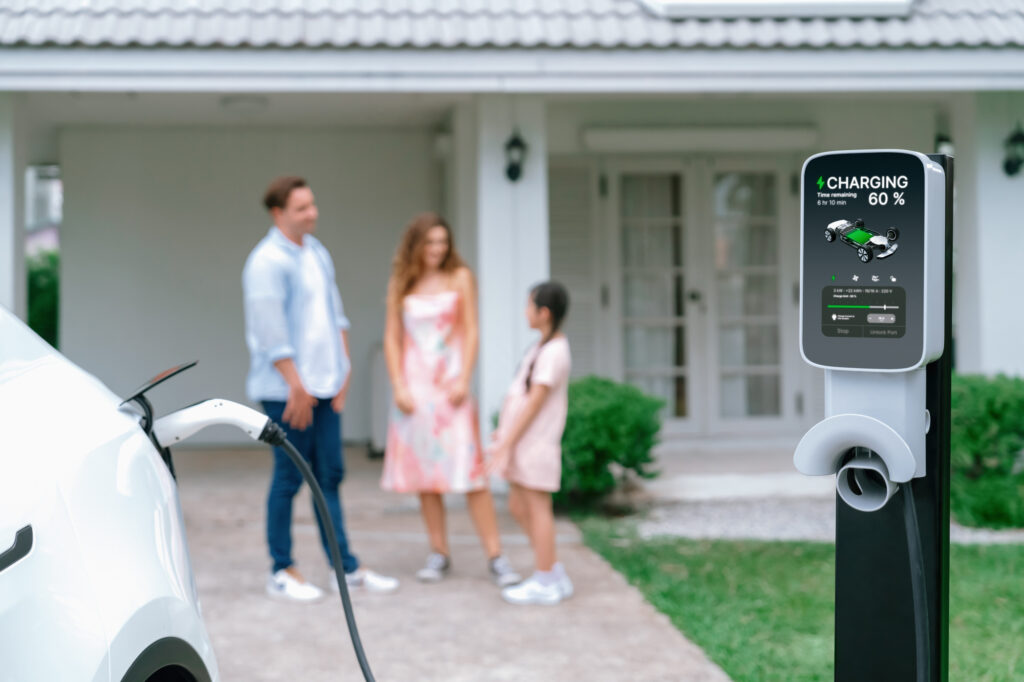Not sure what charger you need? Click here
EV1 is one of the most experienced home charger installation experts in Orange County. Having been in the EV charging industry since 2019, we have spoken to hundreds of current and prospective EV owners who have every type of question regarding Home EV Charger Installation, such as: –
The above applies irrespective of whether you are installing a Lectron, a ChargePoint, a Tesla or any other type of EVSE or EV charger for your home.
One of the most frequent questions we receive about EV charger installations (also known as EVSE installations) is the cost of a Home EV charger installation. We boil down the top 10 home charger installation costs and considerations for your home.
The typical install cost is $700 to $800 for a more standard installation. This applies approximately 50% of the time. A more accurate estimate is possible once the electrician removes the electrical panel cover. Multiple factors impact the cost of an installation, such as:
a. The capacity on your existing electrical panel. For example, are there empty slots, or is each slot taken, and there are no spare power lines to the house.
b. The amp supply of the panel (100 is low service power, 200 amps is much more ideal.
c. The distance of the EV charger from your electrical service panel.
d. If the EV charger will be a plug-in mobile EV charger or a hardwired station.

The first consideration is the electrical code. This means the following according to electrical code standard 625, which covers the key home charger installation requirements for EV chargers (also known as EVSEs). The key requirements of this code are:-
Location:
a. EV chargers may be installed indoors or outdoors. Indoor installations require good ventilation and airflow.
b. The EV Charger location to allow easy and direct connection to the electric vehicle. This obviates the need for extender cables or extension cords.
c. EV chargers must be installed at least 18 inches off the ground indoors and at least 24 inches off the ground or higher when installed outside.
Enclosures: All receptacles installed in a wet location (generally outdoors and exposed to weather elements, need a receptacle enclosure
Use of a Ground-Fault Circuit Interrupter Protection: All single-phase receptacles used for EV charging rated 150 volts to ground or less, and 50 amperes or less need ground-fault circuit-interrupter protection.
Interlock: EV Chargers must have an interlock that de-energizes the connection end of the EV charger and its cable when uncoupled from the EV. This doesn’t require 125 volt, single phase, 15 and 20 ampere receptacle outlets.
There are two types of level 2 EV charger installations, namely plug-in installations and hardwired installations, which are the two preferred electric charger installations. Costs will be impacted by the type of installation. In certain circumstances, a hardwire installation can be less than a plug-in installation. Hardwire installations wire the EV charger directly into the panel breaker, avoiding the cost of commercial-grade outlets and sometimes less wiring. The best home charger EV installations are a level 2 EV charger, one that is hardwired (no plug outlet but into the panel directly) and should be at least 18 inches off the ground (for indoor use), and at least 24 inches off the ground for outdoor use.

A level 2 EV charger has the following characteristics: –
a. It will typically get 24-32 miles of electrical driving per hour of EV charge.
b. Its voltage is 208-240 volts rather than a level 1 EV charger (125 volts). 208 volts in commercial applications and 240 volt in residential charging
c. Level 2 EV chargers can typically charge an EV from 0% to 80% charge in 4-10 hours and a plug-in hybrid in 1 to 2.5 hours.
d. The current max level 2 EV charger is 48amp requiring a 60 amp service breaker.
e. It is AC charging, not DC charging
f. It is well suited to fast, home EV charging
g. Hardwired or a NEMA 14-50 outlet are the most common level 2 EV Charger installations.
In Orange County and other States, the two biggest factors that drive up cost are the need for service panel upgrades and the distance of the EV charger from your electrical panel. Trenching, whereby the charger cable needs to be run underground will significantly increase the costs of an EV plug or EV install.
A NACS EV Charger connector, also known as a Tesla connector, is the North America Charging Standard. It is lightweight and is a standardized design for AC or DC charging. No need to worry about adapters!
J1772 is a 5 pin charging head, which is single phase alternating current charging only. It is also known as type 1. It is currently used by most automakers in the U.S., except Tesla. From 2025 many EV automakers will switch from J1772 Type 1 to NACS.
Yes, no problem. We are not aware of any compatibility issues. The reality is that the EV automakers rely on Electrify America, ChargePoint, and EV Go for level 2 and DC charging in many locations.
The answer really depends on your situation. Here is our quick breakdown:
Hardwired EV chargers tend to be around $500-$700. Plug-in 14-50 type EV chargers around $395-$500 depending on the brand. With installations typically $700-$900, then the total cost is around $1,500.
We are authorized re-sellers of Wallbox Pulsar EV chargers but can perform any home EV charger installation. We will not install 10-30 or 10-50 type NEMA EV chargers and will not install EV chargers that do not have grounding or ground fault detection.
The typical time is 2-3 hours but we know more once we take the electrical panel cover off and verify wiring as well as supply to the service panel. The most common issue is lack of available circuits or more power needed to the panel in order to allow the addition of a 50amp or 60amp EV charger.
We are a top EV charger installation company in Orange County. We install all types of EV chargers, including Porsche, Ford, Rivian, Tesla, ChargePoint, Juicebox, Lucid, and Polestar chargers. If your question is “who can I go to for EV charger Installations near me?” then try the EV1 difference today and call EV1 at 949 426 8246 or email [email protected]. We are EV charging experts!
Get Your Upfront Pricing Estimate. EV1 is Orange County’s expert EV product and installation service specialist. For custom, expert home charging installation, call 949 426-8246 or Get your quote now.